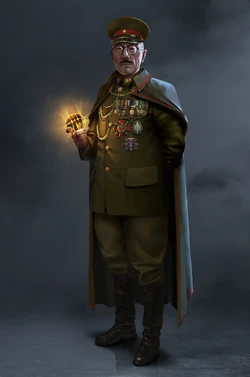Hideki Tojo (December 30, 1884 – December 23, 1948) was a general of the Imperial Japanese Army (IJA), the leader of the Imperial Rule Assistance Association, and the 40th Prime Minister of Japan during much of World War II, from October 17, 1941, to July 22, 1944, as well as the Grand Master of the Japanese Rite of the Templar Order during Second Sino-Japanese War. As Prime Minister, he was responsible for ordering the attack on Pearl Harbor, which initiated war between Japan and the United States, although planning for it had begun in April 1941 before he entered office. After the end of the war, Tojo was arrested, sentenced to death for Japanese war crimes by the International Military Tribunal for the Far East, and hanged on December 23, 1948.
Earlier Life[]
Hideki Tojo was born on 30 December 1884 in Tokyo, Japan. In 1905, he graduated from the Japanese Military Academy, and in 1928 he was promoted to Colonel, believing in militarism and Japanese nationalism. Moreover, he joined the Templars and fastly become second-in-command of Grand Master. In September 1935, having been promoted to Major-General, he took command of the Kwantung Army's military police during the Second Sino-Japanese War and was one of the nationalist officers who put down the February 1936 coup by radical political factions within the Imperial Japanese Army, and he united the Toseiha faction with the patriotic (albeit anti-political) factions of the Japanese army. Also, he participated a full-scale assault on the Japanese Brotherhood of Assassins. He ordered to arrest most members of Assassins in Japan and executed them. A little part of assassins escaped to China.
Becoming Grand Master[]
After February 26 Incident, he became the Grand Master of the Japanese Rite of the Templar Order and chief-of-staff of the Kwantung Army, and his only real combat experience was during Operation Chahar. He ordered a Templars Squad to search the Isu temples from China.
As Minister of War from 1940 under Prime Minister Fumimaro Konoe, he was a proponent of the Tripartite Pact with Nazi Germany and Italy, and he oversaw the Japanese occupation of French Indochina. As the Dutch, French, and British troops withdrew their troops from Southeast Asia to reinforce their armies in Europe in 1939, Tojo advocated invading Indochina to bypass the United States' trade embargo against Japan and to secure much-needed raw materials.
As Prime Minister[]
In October 1941, he became the new Prime Minister under Emperor Hirohito. Tojo became the face of fascism in Japan and ordered the Attack on Pearl Harbor on 7 December, and despite a great series of campaigns that took over much of East Asia, Japan began to lose the war by 1943, and after the Battle of Saipan he was dismissed as Prime Minister and Chief of Staff of the Imperial Japanese Army. It is said that Fumimaro Konoe had a part in his downfall.
Arrest, trial, and execution of Tojo[]
After Japan's unconditional surrender in 1945, U.S. general and Assassin ally Douglas MacArthur ordered the arrest of forty alleged war criminals including Tojo. Three American GIs were sent to serve the arrest warrant. As American soldiers surrounded Tojo's house on September 11 he shot himself in the chest with a pistol, but missed his heart. As a result of this experience, the Army had medical personnel present during the later arrests of other accused Japanese war criminals such as Shimada Shigetaro.
After recovering from his injuries, Tojo was moved to Sugamo Prison. While there he received a new set of dentures, made by an American assassin George Johnson who lost his family in Attack on Pearl Harbor, into which the phrase "Remember Pearl Harbor" had been secretly drilled in Morse code. George ground away the message three months later.
Tojo was tried by the International Military Tribunal for the Far East for war crimes and found guilty of, among other things, waging wars of aggression; war in violation of international law; unprovoked or aggressive war against various nations; and ordering, authorizing, and permitting inhumane treatment of prisoners of war.
Crimes committed by Imperial Japan were responsible for the deaths of millions, some estimate between 3,000,000 and 14,000,000 civilians and prisoners of war through massacre, human experimentation, starvation, and forced labor that was either directly perpetrated or condoned by the Japanese military and government with a significant portion of them occurring during Tojo's rule of the military. One source attributes 5,000,000 civilian deaths to Tojo's rule of the military.
Tojo was sentenced to death on November 12, 1948, and executed by hanging 41 days later on December 23, 1948.

